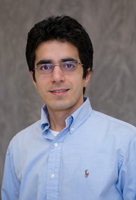Congratulations to CEE doctoral student Abdollah Shafieezadeh who has been awarded a Sam Nunn Post-doctoral Fellowship for the 2011-12 academic year. Funded by the MacArthur Foundation’s Science, Technology, and Security Initiative, the Sam Nunn Security Program at Georgia Institute of Technology is committed to educating scientists and engineers about national security issues and providing the analytical tools they need to interact with the policy community. The program selects young and mid-career scientists and technology experts for intensive year-long training in research approaches and policy formulation methods for addressing national and international security issues.
Technology, and Security Initiative, the Sam Nunn Security Program at Georgia Institute of Technology is committed to educating scientists and engineers about national security issues and providing the analytical tools they need to interact with the policy community. The program selects young and mid-career scientists and technology experts for intensive year-long training in research approaches and policy formulation methods for addressing national and international security issues.
Abdollah earned his Ph.D. in structural engineering in 2010, under the advisement of Dean's Professor Reginald DesRoches. His research focuses on understanding and modeling earthquake-induced damage to waterfront infrastructure (e.g., wharves and container cranes) at seaports throughout the world. He currently works with CEE Professor Glenn Rix who nominated him for this honor. Rix states "Abdollah is among the most capable Ph.D. students I have had the pleasure of working with in my 20+ years at Georgia Tech. His research is an important part of a National Science Foundation project that I direct on managing seismic risks for the overall container port system."
Seaports are critical assets in the U.S. as well as in other countries around the world which are active in international trade. Approximately 40 percent of the value of U.S. international trade passes through ports, more than any other mode of transportation, and their importance will likely increase given the expected growth in trade within Asia and Pacific-Rim nations. Because they are intermodal transfer points, ports concentrate commercial activity in a small geographic area, making them prone to disruption by natural (and man-made) hazards. Many of the world’s busiest ports are located in areas with significant seismic hazard, including all of the large western U.S. ports (Ports of Los Angeles, Long Beach, Oakland, and Seattle) and several eastern U.S. ports (Ports of Savannah and Charleston). Earthquake-induced losses due to physical damage to port infrastructure and the resulting business interruption can have severe adverse consequences for the port’s public and private stakeholders as well as national security implications. Recent examples include Haiti (2010), Chile (2010), and Japan (2011), where port damage had (or is having) an effect on short-term emergency response as well as longer-term recovery efforts.
As a result, the decisions regarding seismic risks at container ports have a public policy component, according to Dr. Rix. He states, "Important that these decisions are informed by the best science, engineering, and technology possible. Abdollah’s work on the vulnerability of port infrastructure to earthquake-induced damage is clearly in this vein. Furthermore, it is gratifying to me to see a young engineer like Abdollah look beyond the technical aspects of this problem and take an interest in public policy and national security issues associated with the protection of civil infrastructure systems and natural disaster management. In his work on our project to date, Abdollah has displayed a maturity of thought that tells me he will succeed at expanding his field of view to include both technical and policy aspects of natural disasters."
The Sam Nunn Security Program is very competitive, accepting between 8-12 fellows every fall. Its The program’s research component revolves around four major research endeavors including Cybersecurity, ICTs in Post-conflict Societies, Nuclear Proliferation, and Partnerships in Homeland Secirity. Selected candidates obtain first-hand knowledge of policy processes through field trips to key governmental and non-governmental organizations in the Southeast and Washington, DC. For additional information, visit: http://www.cistp.gatech.edu/programs/sam-nunn-security-program/.
